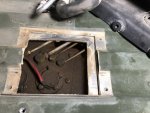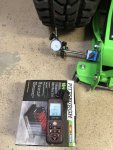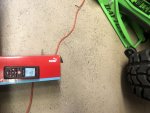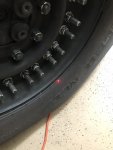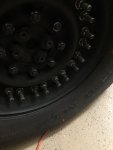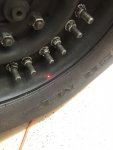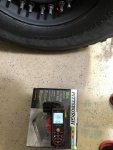Since the beginning I had this light vibration in the front end around 70mph and higher and I attributed it to the old tires.
The vibration is visible via the hood air lift hook, which moves side to side about 1/4" (about 1/8" or so on each side), while the hood appears static, so it looks like the chassis is slightly moving against the body, not sure if all HMMWVs have a similar chassis vs. body play?
The new tires are balanced, I saw the shop zeroing them out (on some they used a lot of weights, maybe about 18oz? they could barely fit it on the wheel) so I started to hunt down the vibration (which is smaller than with the old tires, bit still present) thinking maybe it is run-out since I built the tires myself and maybe I screwed something up. I called a few shops around and they said the tire is too aggressive to do a run-out test so I came up with a home made version.
At first I tried to use the milling machine table calibration dial indicator which has a 0.0005" resolution, but it kept getting caught in the tire tread as I was rotating it (I lifted each wheel and rotated each wheel by hand with the transmission and TC in Neutral), so I switched to a Leica D330 laser meter with a 0.004" (0.1mm) resolution (its absolute accuracy is 0.039"/ 1mm, but in this case the resolution is important because this is a relative measurement to see the worst min/ max deviation) and measured both front tires tread run-out, run-out at the bead and even the side wall and the wheels at the bead lip and also at the base of the bolts:
View attachment 859060
View attachment 859061View attachment 859062
View attachment 859063
View attachment 859065
View attachment 859064
The largest deviation was on the tire tread and side wall (don't think that sidewall deviation is usually measured for run-out, but I did it just to get more datapoints since I could not find anything major) between 0.05" and 0.07" and the wheels were even less.
Also, front tires side wall worse deviation between front area and rear is also about 0.07" (checked to see if they are parallel with each other).
I also pushed the wheels while lifted to see if the whole wheel hub had any play and the movement was minimal, it felt like less than 1/8", more like 1/16".
Given these measurements, the front tires or wheels do not appear to be have any large run-outs or being out of round.
I started looking into this vibration thinking that maybe the front diff input seal started to leak because of the vibration as the truck has only 8,000 miles and don't believe that the seal just failed. The leak seems to started to occur in its earlier days, way before I got it as there was gunk accumulation that looked old when I cleaned it.
I did not get around to change the seal yet and the leak is very marginal, maybe a small drip if you wipe the finger around the drive shaft, nothing that would make it on the floor.
Is it normal for the air lift hood hook to have this type of side-to-side movement against the hood at 65=70+ mph? I would have thought that the 12k chassis being so stiff this should not occur?
Just trying to understand what else should I look for?
I am thinking to rebuild the tires without the run-flats as the static measurements look OK and this appears to be more of a dynamic issue as it manifests with the increased speed? But that's a lot of work and a lot of beers LOL, so I thought to run it by you first




